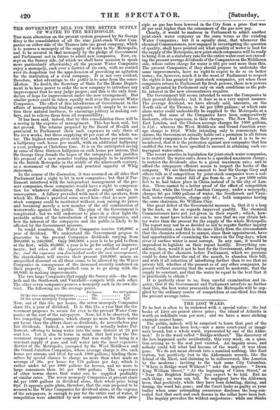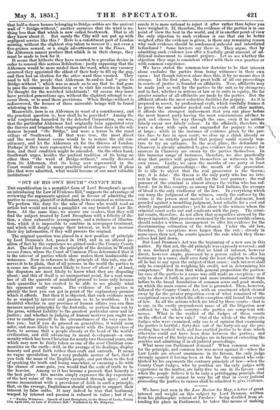THE LOST WARD.
To be lost is often to be endowed with a special value : the lost books of Livy are prized above price ; the island of Atlantis is worth an indefinite sum per acre ; and we have a more striking example nearer home.
The public, indeed, will be surprised to learn that part of the City of London has been lost,—not a mere court-yard or imagi- nary bound, but a whole ward, represented by one of the Alder- men ! It is the ward called "Bridge-without.' The discovery of the loss happened quite accidentally, this very week, on a ques- tion arising as to the seat just vacated. An inquiry arose, and nobody could tell what had become of the ward. it was clean gone. We do not mean shrunk into a nominal nothing, like East Gatton, but positively lost to the Aldermanic records, like the Island of the Blest, and claiming to be rediscovered, like America by the moderns ; inviting to the task some City Columbus. "Where is Bridge ward Without ? " asks the inquirer. "Down King William Street," "At the beginning of Union Street," or "Near the Brighton Railway," you expect to be told. But no such thing ; no man can tell. So negligent have the Aldermen been, that positively, while they have been debating, dining, and dozing, the ward has gone ; and the Court looks as guilty as your butler when some astounding occurrence discloses the long-con- cealed fact that such and such dozens in the cellar have been lost.
The inquiry provokes the wildest conjectures : while one thinks
that half-a-dozen houses belonging to Bridge-within are the ancient wall of "Bridge-without," another surmises that the ward is no- thing less than that which is now called Southwark. That is all they know about it. But surely the City will not put up with negligent service like this ? Here is a constituent part of London missing, without the slightest step taken to recover it ; not even a five-guinea reward, or a single advertisement in the Times. If the Aldermen cannot produce that which is in their charge, they must be made to look for it.
It seems that hitherto they have resorted to a peculiar device in order to-conceal this serious defalcation : justly supposing that the Aldermen would be more misled than the ward, when any vacancy occurred they appointed the oldest of their body to fill up the gap, and then had an election for the other ward thus vacated. They used to tell the people that Alderman So-and-so had "gone to Bridge-without "; which was as much as to say that he had gone to pass the summer in Barrataria or to visit his castles in Spain. No thought for the wretched inhabitants ! Of course they must have perished generations ago, without the slightest attempt to re- cover them, or to send them provisions. When Bridge-without is rediscovered, the houses of those miserable beings will be found whitening in the sun. Meanwhile, here is an Alderman in want of a constituency, and the practical question is, how shall he be provided ? Among the wild conjecturea hazarded by the detected Corporation, one was, that the particular Alderman had originally been appointed over the thieves and brigands that congregated in those days in the wil- derness beyond "the Bridge," and were a terror to the rural village of Southwark. If that were true, the most direct and the most honest course would be to restore the old con- stituency, and let the Alderman sit for the thieves of London. Perhaps if they were represented they would receive more atten- tion, and their condition might be amended. On the other hand, Southwark urges, besides the poetical tradition of its being no other than "the ward of Bridge-without," cruelly divorced from its Alderman, that its being now represented in the Court would result in many practical advantages : but if pleas like that were admitted, what would become of our most valuable institutions ?



























 Previous page
Previous page